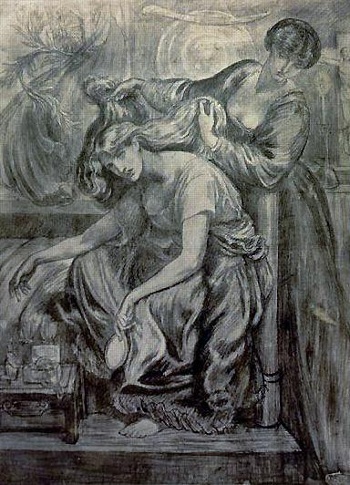Othello Contents
- Religious/ philosophical context
- Theatrical context
Act 4 Scene 3
Synopsis of Act 4 Scene 3
 This quiet bedroom scene is ‘the calm before the storm’. While Othello conducts business with Lodovico, he tells Desdemona to go to bed and send Emilia away for the night. Emilia and Desdemona discuss Othello’s behaviour and while Emilia wishes that Desdemona had never seen him, Desdemona will not criticise him, saying that nothing he can do will stop her loving him.
This quiet bedroom scene is ‘the calm before the storm’. While Othello conducts business with Lodovico, he tells Desdemona to go to bed and send Emilia away for the night. Emilia and Desdemona discuss Othello’s behaviour and while Emilia wishes that Desdemona had never seen him, Desdemona will not criticise him, saying that nothing he can do will stop her loving him. Desdemona is mournful as she prepares for bed and sings a melancholy song. The two women discuss the female potential for infidelity to their husbands. Though Emilia admits that she would be unfaithful if she could profit sufficiently by it, Desdemona states that nothing would ever entice her to be unfaithful to her husband. Emilia believes that women are no different than men in their desires and weaknesses, and can be just as jealous and fickle. Desdemona disagrees and seeks only to make the world a better place.
Commentary on Act 4 Scene 3
incontinent – This means ‘at once’ but can also mean ‘out of control’.
prithee shroud me / In one of these same sheets – Desdemona is being morbid here and imagining she will die soon. A shroud was a sheet used to wrap dead bodies.
he she lov’d prov’d mad – Ominously the ballad’s context echoes that of Desdemona.
 willow – Due to the hanging arch of its boughs, this tree is often referred to as the ‘weeping willow’ and is associated with sadness and even death. Songs about willow trees are usually associated with sorrow and dying. Hamlet’s despairing girlfriend Ophelia falls from a willow tree to her death.
willow – Due to the hanging arch of its boughs, this tree is often referred to as the ‘weeping willow’ and is associated with sadness and even death. Songs about willow trees are usually associated with sorrow and dying. Hamlet’s despairing girlfriend Ophelia falls from a willow tree to her death.I should venture purgatory for’t. – According to the teaching of the Catholic Church, purgatory was a place to which went the souls of those who needed to be purged of their sins went, for as long as was deemed necessary, before they were allowed into heaven. Emilia is therefore being scandalously irreligious in saying she would risk being sent to purgatory if it meant a big enough advantage for her in this world.
the wrong .. your own world .. make it right – Emilia echoes Iago’s pragmatic reasoning. She lacks Desdemona’s sense of eternal values.
I do think it is their husbands’ faults / If wives do fall. - This attitude from Emilia would be a scandalous one to most women of Shakespeare’s day. As she outlines what it feels like to be an ill-treated wife, she evokes sympathy for both herself and Desdemona. Unlike her mistress however, she concludes that, ‘if you can’t beat ’em, join ’em.’ Whilst this strikes a blow for female equality, the audience would more admire the grace and virtue of Desdemona who will not stoop to such behaviour.
Investigating Act 4 Scene 3
- Study Emilia’s speech starting from ‘Yes a dozen … until their ills instruct us so.’
- What complaints about husbands does Emilia list here?
- What reasons does she give for husbands being unfaithful?
- In what ways are wives similar to husbands, in her view?
- If Emilia believes that wives should have as much freedom as erring husbands, while Desdemona takes a very different view, what does that tell us about the differences between the two women and the state of their marriages?
- What is the dramatic purpose of this scene?
Traditional poem or song, usually consisting of quatrains with abcb rhyme and iambic tetrameters.
1. All Christians worldwide.
2. The Church in the West until the Reformation.
3. The Roman Catholic Church.
In traditional Roman Catholic doctrine, an 'antechamber' to heaven, a place between Heaven and Hell, where the souls of those dead who are not damned, but not yet fit for heaven, go to be purged (purified) of their sins.
The spirit which gives life to a human being; the part which lives on after death; a person's inner being (personality, intellect, emotions and will) which distinguishes them from animals.
1. to make pure, to cleanse, to remove. 2. a cathartic medicine.
Disobedience to the known will of God. According to Christian theology human beings have displayed a pre-disposition to sin since the Fall of Humankind.
Recently Viewed
-
Othello » Act 4 Scene 3
now -
The Winter's Tale » Introduction
just now -
Tips for successful study
just now -
Othello » Plots and sub-plots
just now -
Othello » Act 2 Scene 2
just now -
Twelfth Night: context links » Introduction
just now -
The world of Victorian writers 1837 - 1901
just now -
Othello » The shape of tragedy
just now
